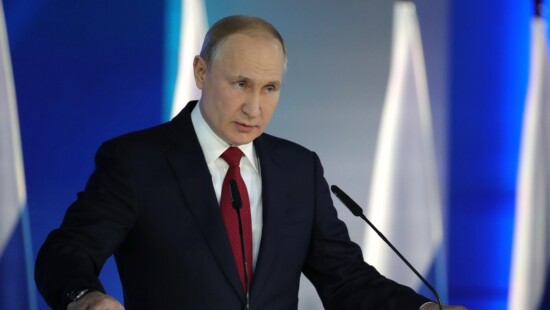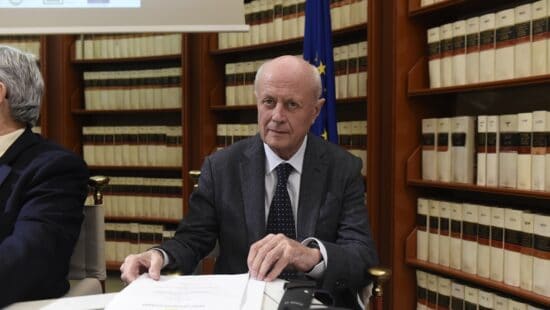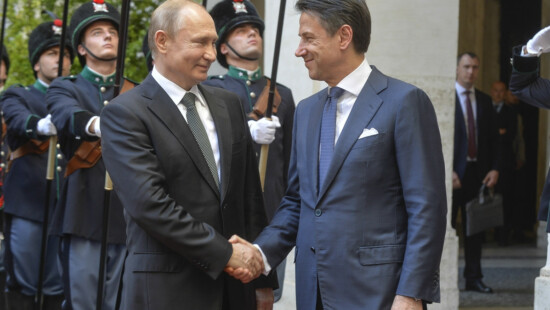11 settembre, il messaggio dell'ambasciatore Eisenberg: "Non lo dimenticheremo mai" [embedyt] https://www.youtube.com/watch?v=-QID9drz6og[/embedyt] Il messaggio dell'ambasciatore statunitense in Italia, Lewis Eisenberg, in occasione del diciannovesimo anniversario dell'attentato alle Torri Gemelle di New York dell'11 settembre. Fonte: Facebok U.S. Embassy to Italy
Archivi
Conte a Domenica In? Sconveniente ma... La versione di Michele Anzaldi
Domenica col presidente. È di oggi la notizia che il premier Giuseppe Conte, sarà ospite nella trasmissione di Rai Uno "Domenica In" dopodomani per rivolgere un messaggio alla nazione. Di per sé, non farebbe neppure notizia. Dopo lo sdoganamento televisivo del primo ministro a reti unificate non ci sarebbe da stupirsi. Se non fosse che domenica saremo a esattamente una…
Maxi esplosione in Giordania, a fuoco un deposito di munizioni dell'esercito. Il video
Maxi esplosione in Giordania, a fuoco un deposito di munizioni dell'esercito [embedyt] https://www.youtube.com/watch?v=RXL3a5BGGCM[/embedyt] Un incendio in un deposito di munizioni dell'esercito in Giordania, a Zarqa, è degenerato in una enorme esplosione che ha illuminato il cielo notturno. Non risultano vittime o feriti. Fonte: Twitter
Lukashenko incontra Putin. L’agenda dell’incontro
Lunedì il presidente russo, Vladimir Putin, incontrerà a Sochi l’omologo bielorusso, Aleksandr Lukashenko. La riunione, anche se con un cambio di luogo, è stata confermata dal portavoce del Cremlino, Dmitri Peskov. L’obiettivo principale dell’incontro sarà discutere lo sviluppo dei rapporti tra Russia e Bielorussia, il loro partenariato strategico e lo stato dell'alleanza. Inoltre, “sarà posto l'accento sull'attuazione dei principali progetti…
No country for Huawei: Italian Dems set agenda on Chinese 5G tech
“Data is the new oil; the Italians’ data is the country’s intellectual property. Thus, I hope that Italy and the whole of Europe become way stricter [on Chinese tech]. I never questioned the commercial and exchange relations with China, but compromises cannot be made on security.” This is how the Italian minister for European affairs Enzo Amendola answered when asked…
Conte al Med7: "I flussi migratori vanno governati, non subiti". Il video
Conte al Med7: "I flussi migratori vanno governati, non subiti" [embedyt] https://www.youtube.com/watch?v=hEiHRmiYa4o[/embedyt] Ajaccio, 11 set. (askanews) - L'Europa deve governare e non subire i flussi migratori. È l'appello lanciato dal presidente del Consiglio Giuseppe Conte, al termine del vertice Med7, gruppo informale dei paesi mediterranei membri dell'Unione Europea (Francia, Italia, Spagna, Portogallo, Grecia, Cipro e Malta), che si è svolto…
Vi racconto l'11 settembre di Trump e Biden. Il punto di Gramaglia
Con riti condizionati dalle misure anti-pandemia, gli Stati Uniti ricordano, oggi, il 19° anniversario degli attacchi all’America dell’11 Settembre 2001, che costarono la vita a circa 3000 persone (circa 2700 solo a New York, un decimo delle vittime del coronavirus). I candidati presidenziali dei due maggiori partiti, Donald Trump e Joe Biden, celebreranno entrambi il ricordo dell’11 Settembre a Shanksville,…
La via stretta di Salvini. La bussola di Ocone
Politicamente, la strada è molto stretta. Ma, a un anno dall’uscita dal governo, Matteo Salvini la sta cominciando a percorrere, sembrerebbe. È la strada di un’opposizione che non conceda nulla al governo e alla maggioranza ma che provi a costruire un percorso che faccia uscire dall’isolamento la Lega, e in sostanza tutto il centro-destra (o destra-centro) italiano. Ovviamente, alla sinistra…
Una destra oltre il centrodestra ci vuole. Cominciamo votando No. Scrive Malgieri
Un sintomo. Soltanto un sintomo. Ma rivelatore di una tendenza che potrebbe allargarsi, dilagare fino a stravolgere gli equilibri politici attuali. Il referendum costituzionale che prevede il taglio dei parlamentari ha innescato una piccola, ma tutt’altro che irrilevante rivolta, nella destra profonda che non si riconosce nelle posizioni di Fratelli d’Italia favorevoli alla significativa riduzione della rappresentanza parlamentare ed ha…
Per un pugno di Mosca. Caro Conte, con Putin non si scherza. Parla Cicchitto
Chi troppo stringe nulla tiene. Fabrizio Cicchitto, presidente di Riformismo e libertà, già a capo della Commissione esteri della Camera, commenta severo l’incidente diplomatico fra Palazzo Chigi e il Cremlino sul caso di Alexei Navalny, l’oppositore russo ricoverato in Germania dopo esser stato avvelenato col Novichok, “una figuraccia”. Tutto parte dalla telefonata del 26 agosto fra Giuseppe Conte e Vladimir…










